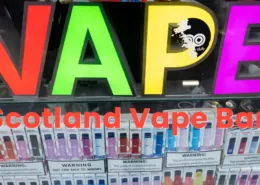WHO Study: UK Girls Surpass Boys in Vaping and Smoking
A recent study conducted by the World Health Organisation (WHO) has unveiled alarming trends in substance use among children in the United Kingdom, particularly among young girls. The comprehensive research, which analyzed data from 280,000 children aged 11, 13, and 15 across 44 countries, has shed light on the growing concern of vaping, smoking, and drinking among UK girls.
According to the study, girls in the UK are more likely to engage in these harmful behaviors compared to their male counterparts, suggesting a shift in traditional gender stereotypes associated with substance use. Professor Sally Kendall from the University of Kent, a contributor to the study, attributes this trend to a “societal change towards girl power” and a “narrowing of stereotypical gender behaviours.”
The study also highlights the correlation between substance use and lower life satisfaction, greater feelings of loneliness, and a diminished sense of well-being among girls, particularly those from less affluent families. This finding emphasizes the need for a holistic understanding of health behaviors and their underlying factors.
One of the most concerning revelations from the study is the widespread issue of underage vaping in the UK compared to other countries. By the age of 15, two-fifths of girls in England and Scotland have experimented with vaping, a figure that surpasses many other developed nations. Dr Jo Inchley, the international coordinator for the study and a researcher from the University of Glasgow, expresses grave concern about the UK’s vaping statistics, noting that the trends appear to be worsening at an alarming rate.
Dr Inchley suggests that the increasing prevalence of vape use among young people may be attributed to the accessibility and affordability of these products, particularly disposable vapes. Schools are reporting that this has become a major issue they must address on a daily basis, highlighting the need for policy responses from governments across the UK to tackle the issue of availability and accessibility.
In addition to the alarming vaping trends, the study has also revealed that children aged 11 and 13 in England are the most likely to have consumed alcohol compared to their peers in other surveyed countries, with high rates of drunkenness among UK girls compared to other European nations. Furthermore, children in Scotland and Wales are more likely to have experimented with cannabis than those in many other countries, with both countries ranking in the top five globally.
Dr Inchley suggests that the COVID-19 pandemic may have played a role in the increasing use of substances among young people, particularly girls in England, and that there may be a link between the mental health crisis experienced by children who went through the pandemic and the rise in substance use.
Dr Hans Kluge, WHO regional director for Europe, emphasizes that the widespread use of harmful substances among children is a serious public health threat that requires immediate attention and action. In response to the findings, a UK government spokesperson has reiterated the health advice that smoking, vaping, and underage drinking can be damaging for young people and their development. The government has introduced the Tobacco and Vapes Bill, which aims to create the UK’s first Smokefree Generation and includes measures to reduce the appeal of vapes to children.
As the UK grapples with this growing public health concern, it is clear that a comprehensive and multi-faceted approach is needed to address the root causes of substance use among young people and to provide the necessary support and resources to help them lead healthy, fulfilling lives.
News Source: Independent
- Bestselling Vapes in UK After Disposable Ban: What to Stock 2025 - August 8, 2025
- Argentina Debates Stricter Vape Laws Amid Prohibition Failures - August 8, 2025
- Nigeria Advocacy Group Urged to Hike Tobacco & Vape Tax by 100% - August 8, 2025









